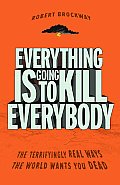
A key component of living forever is functionality: Who wants immortality, if it means centuries of joint pain, 4AM breakfasts, driving 30 miles an hour on the freeway, and an inexplicable fondness for Larry King? The first step to meaningful longevity is extending the quality of our old age.
And that's great: Research in this field even benefits the existing elderly, who might not otherwise reap the full rewards of longevity extension breakthroughs. If they can't live forever, at least we make it so it doesn't feel like they're trapped in a wet bag — all achy, cold, and smelling of burlap — for the last thirty years of their lives.
Start with infirmity: When human muscles age, they become less able to repair themselves, therefore less able to heal and rebuild themselves stronger after exertion. It's the reason your grandma acts like you've suddenly become He-man when you lift a grocery bag for her, and also why you generally don't see geriatric dudes rockin' the half-shirts to show off their sweet abs... which is probably for the best, really. But science is on the path to fixing that (for better or worse).
Researchers at the University of California recently stated that "the ability of old human muscle to be maintained and repaired by muscle stem cells can be restored to youthful vigor given the right mix of biochemical signals." That means they've found a way to restart the healing process in old muscle. In other words, they could, at least partially, give the elderly their younger bodies back.
And they're not the only ones: University of Missouri scientists have isolated a longevity gene in mice called MCAT, which is responsible for destroying the destructive free radicals in mitochondria. While that sounds like inscrutable biology speak (or possibly the plot to the new Star Wars prequels,) it basically just means that, by injecting the gene into a harmless virus and infecting the mice with it, the researchers were able to artificially provoke a much higher level of physical health in the mice. They were able to run faster and farther than the other uninfected mice, and for much, much longer. If similar techniques could be applied to elderly humans, the boost in stamina could compensate (or maybe more than compensate) for the natural decay of aging. So we're giving senior citizens increased endurance and the heightened muscle-building abilities? You know what that means:
We all need to start mentally preparing for old people gangs.
That's just logically where this is going: Old people are notoriously grumpy, fed-up with your uppity crap, and are staring down their own mortality every day. Give them muscle and endurance back, and every day is Geriatric Fight Club.
But I digress. The point is, soon we could theoretically be more active, stronger, and extend our life spans. But that's all theory: None of what we've covered so far has actually been applied yet. And besides, living a longer, better life is great, but that's still not quite forever, is it? Scientists are going to have to significantly slow down ageing — or even stop it entirely — to achieve literal immortality. That's always going to be the stuff of science fiction, right? Not necessarily...